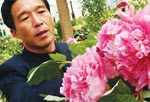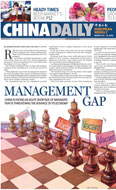Asia
Tokyo: Tap water not safe for infants
Updated: 2011-03-23 15:17
(Agencies)
DRAMA AT FUKUSHIMA
Technicians working inside an evacuation zone around the plant have successfully attached power cables to all six reactors and started a pump at one to cool overheating nuclear fuel rods.
Concern is high over reactor No 1 after its temperature rose to near 400 degrees Celsius, above a design limit of 302.
As well as having its workers on the front line in highly dangerous circumstances, TEPCO is also facing accusations of a slow disaster response and questions over why it originally stored more uranium at the plant than it was designed to hold.
Vienna-based UN watchdog, the International Atomic Energy Agency (IAEA), expressed concern about a lack of information from Japanese authorities. It cited missing data on temperatures of spent fuel pools at the facility's reactors 1, 3 and 4.
"We continue to see radiation coming from the site ... and the question is where exactly is that coming from?" said a senior IAEA official, James Lyons.
US Defense Secretary Robert Gates said he was concerned about radioactive fallout affecting the US 55,000 troops in and around Japan, many involved in a massive relief operation for Washington's close ally. "We're also deeply concerned about the wellbeing of our Japanese allies," he said.
Experts said tiny traces of radioactive particles, measured by a network of monitoring stations as they spread eastwards from Japan across the Pacific, North America, the Atlantic and to Europe, were far too low to cause any harm to humans.
"It's only a matter of days before it disperses in the entire northern hemisphere," said Andreas Stohl, a senior scientist at the Norwegian Institute for Air Research
GLOBAL IMPACT
The Japan crisis has dealt a blow to the nuclear power industry around the world. Italy became the latest nation to re-assess its programme, announcing a one-year moratorium on site selection and building of plants.
Crisis in the world's third-biggest economy -- and its key position in global supply chains, especially for the auto and technology sectors -- has added to global market jitters, also affected by conflict in Libya and unrest in the Middle East.
Asian shares fell on Wednesday, with Tokyo's Nikkei shedding more than 1 percent as investors took profits from a two-session bounce. Japanese stocks are about 8 percent below their close on the day the 9.0 magnitude earthquake struck.
Toyota said it would delay the launch in Japan of two additions to the Prius line-up, a wagon and a minivan, from the originally planned end-April due to production disruptions.
The tsunami and earthquake are the world's costliest ever natural disaster, with the government estimating damage at 15-25 trillion yen ($185 billion-$308 billion.
The upper end of that range would equate to about 6 percent of Japan's gross domestic product.
The official death toll has risen to 9,199, but with 13,786 people still reported missing, it is certain to rise.
There are reports dozens of survivors, mostly elderly, have died in hospitals and evacuation centres due to a lack of proper treatment, or simply because of the cold. It is winter in Japan.
At one sports arena in Minamisanriku where 1,500 evacuees are staying, old people crowded at a counter stacked with pills and bandages, while about 30 people slept on beds or on the floor in a makeshift clinic with doctors on standby.
"It's less a problem of medical supplies now, but a problem of finding out what medicine is lacking where and centralising that information," said Nobuyuki Maki, a doctor.
"Many places in this area haven't restored mobile phone connections yet so there are still problems with communication."
E-paper

Rise and shine
The Chinese solar energy industry is heating up following recent setbacks in the nuclear sector
Bombs aim for regime change
CSI, with a twist
Literary path
Specials

Peony express
Growers of china's unofficial national flower are reaching out to europe for help

Tea-ing up
More turning to Chinese tea for investment opportunities like vintage wine

A cut above
The ancient city of Luoyang is home to a treasure trove of cultural wonders.
